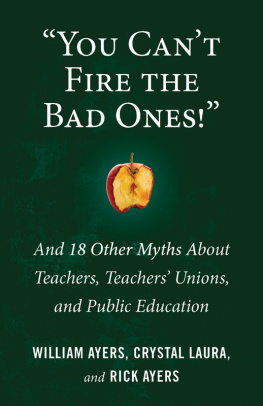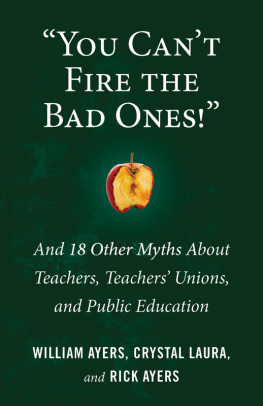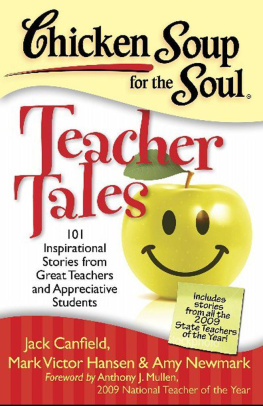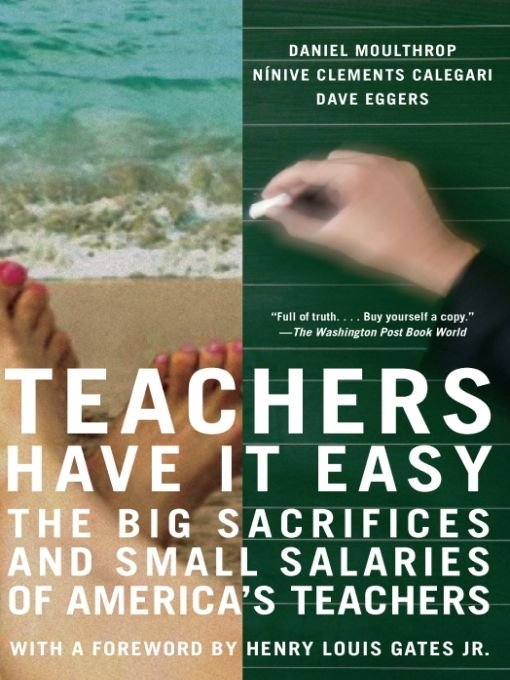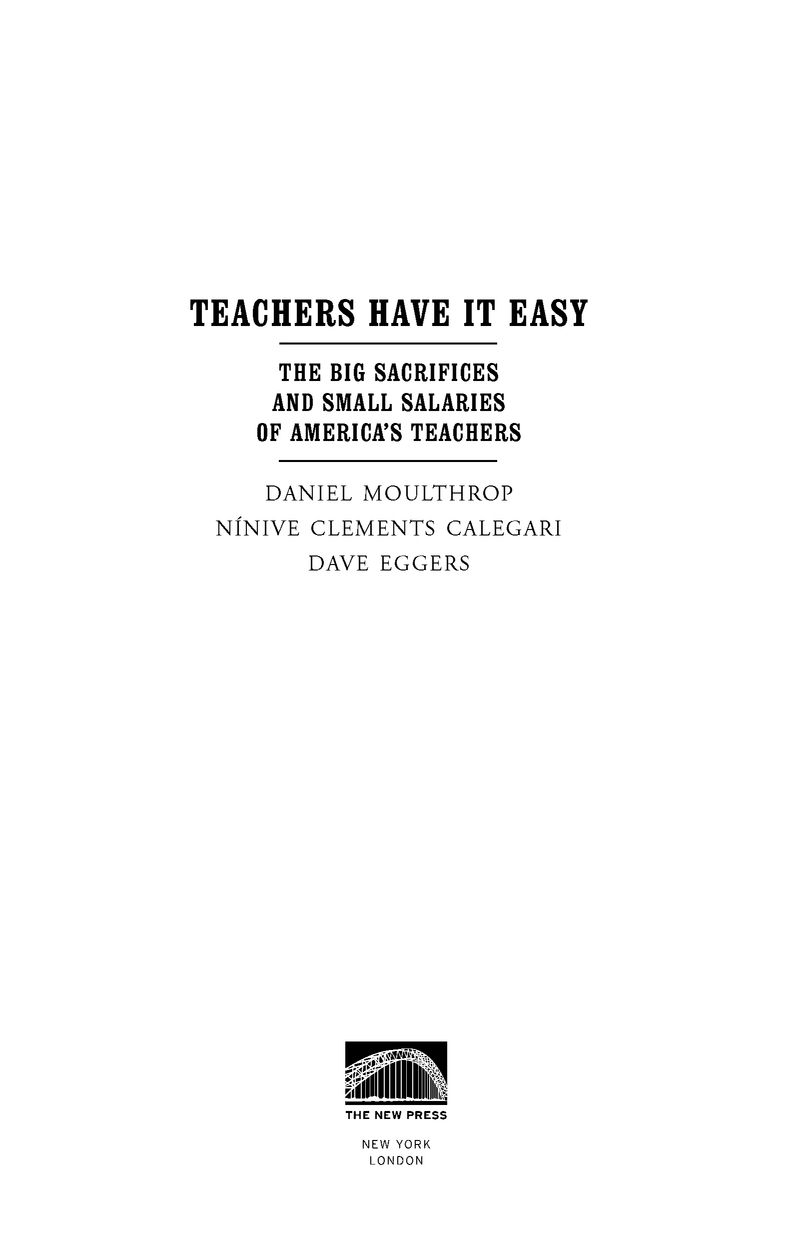Table of Contents
Further Praise for Teachers Have It Easy
We will have achieved a kind of Golden Ageenlightened, hopeful, and advancedwhen teaching is treated as the preeminent, transcendent enterprise it really is, and children are recognized as the foremost members of society. This book maps the fault lines between that ideal and the hard, sometimes brutal realities we face in schools. It charts, as well, a hopeful path for the struggle ahead.
WILLIAM AYERS, Distinguished Professor of Education, University of Illinois at Chicago, and author of Teaching Toward Freedom
How can it be that those devoted souls who labor so long and hard to teach our children to be thoughtful citizens must work in embarrassingly shabby schools and get paid salaries that are almost at the bottom of the national pay scale? Teachers Have It Easy explores this shameful reality thoroughly and thoughtfully. Every public official with anything to do with education should read it, weep, and then get mad as hell and do something about the problem.
ORVILLE SCHELL, dean, Graduate School of Journalism, University of California, Berkeley
If American citizens truly believe in building a world-class public education system, we might consider paying our teachers more than third-world wages. Most of us lucky enough to have benefited from the attention and care of public school employees have no idea what these mentors go throughthe early mornings, the late nights, paying for school supplies out of their own (already threadbare) pockets. This book is an argument for righting such appalling wrongs.
SARAH VOWELL, This American Life commentator and author of The Partly Cloudy Patriot
To our teachers and all teachers
PREFACE TO THE PAPERBACK EDITION
When this book was first published in the summer of 2005, we wrote in a related newspaper column that summer is a bizarre and unsettling time in the lives of students, parents, and teachers. Thats mostly due to the fact that as school lets out, many teachers head to another job in order to pay their bills. June is a strange month for teachers because they go from being academic leadersfrom shaping the minds and morals of future citizens and being filled with a sense of purposeto serving cocktails, painting houses, and selling flat screens at Best Buy.
Thats still true, but theres a different sort of unsettling going on right now in the lives of public school teachers. Its a bit deeper, and it may unsettle public education for a while to come. Its this: teacher pay is changing. Its not happening in every district, or even, as far as we know, in every state. But over the last two years, in more and more districts, both administrators and teachers are giving thought to changing what and how teachers are paid. These reforms appear to be altering what have been immutable expectations about the professionwho goes into it, who stays and for how long, what kind of teacher someone becomes after a decade or more in the classroom, and, of course, how much a teacher can expect to earn over the course of his or her career.
This book was born of a desire to chronicle the lives of teachers and to learn more, as Studs Terkel might, about how teachers feel about what they do all day, and how teachers feel about what they get paid for doing what they do all day. As we got into the business of reporting and listening to teachers, we realized that their experiences and their sacrifices, while central, were only a part of the storythe first part. The second part was the responsethat is, what happens when districts and schools listen to their teachers stories and begin to understand that their teachers do not, in fact, have a particularly easy time of things but are, instead, considering fleeing their profession in search of something more manageable, better paid, or both. So we started talking to people who were involving themselves and their schools and districts in some high-profile and some not-so-high-profile salary reform. In chapter 12, Success in ReformWhat Happens When Districts and Schools Start Paying Teachers More: Three Experiments That Worked, we tell the story about reform in the Denver public schools, the Helena public schools, and a charter school in the Los Angeles area, the Vaughn Next Century Learning Center.
To be honest, only Vaughns story had been in place long enough to say the whole thing had worked. Denver and Helena were very much in the middle of the process, but both processes had been characterized by success. When we were writing the book, complete pay systems were still at least a year or more off. Now, two years after we first visited those districts, Denver and Helena have joined Vaughn as places where waves of teachers are signing up for more demanding pay programs that require them to teach well and to continue to become more effective in the classroom.
In Denver, the salary reformcalled ProCompcame with the support of the voters; in 2005, some 58 percent of residents voted to tax themselves to the tune of $25 million annually to support the new pay program. When the district first invited teachers to sign up, about 20 percent of the four-thousand-plus teachers did so mid-year, with some realizing immediate pay increases of more than $8,000, thanks mostly to market incentives for teaching in hard-to-staff positions or hard-to-serve schools. At this point, every time the district opens up an eight-week window for teachers to move to the new system, they need four full-time employees to handle the information requests. Since the beginning of 2006, all new hires are part of the new pay system.
Helena, Montana, has only about 540 teachers, but nearly 75 percent of them have signed up for the districts new pay program. Its been in effect for just two years. Larry Nielsen, president of the Helena Education Association, says that among the teachers he represents, there was fear throughout the process of designing and implementing the new program, but their worst fears didnt come true. They are making a lot more money. Ive got to be honest with you, people like it.
Theres not much hed do differently, he saysmaybe tweak the new salary increments a little, or create a role in the district for what he likes to call super teachers. Still, when he looks at the program, at the nearly four hundred teachers who are getting paid more for making their own professional development relevant to the classes they teach, and at the twelve teachers and administrators on the transition team who iron out every problem that comes up, he says he feels a little bit like a proud papa.
At the Vaughn school, the salary reforms begun in the 1990s have been paying dividends in the forms of effective teachers and successful students. Capitalizing on its strength and its ability to attract good teachers, Vaughn is expanding to include a high school. Current academic programs are also expanding. For example, the foreign language program has grown well beyond Spanish: now the school offers Chinese and Arabic as well. Dr. Yvonne Chan, who launched much of the reform, is spreading her influence through her new position on Californias State Board of Education
Though they faced many hurdles, leadership in the Vaughn communityadministrators, teachers, and parentswere free from the constraints of union negotiations when they created a new compensation program as the foundation for attracting and nurturing a strong, capable faculty. In Helena and Denver, local unions had to buck their national leadership to make these reforms happen. While the National Education Association continues to hew to the position that the traditional salary scale serves teachers the best, many of their affiliates are taking new approaches. The leaders of the reforms in Denver and Helena are talking to their counterparts in Mitchell, Nebraska, in Bozeman, Montana, in Austin and even Las Vegas where a county-wide school district employs nearly 16,000 teachers.





